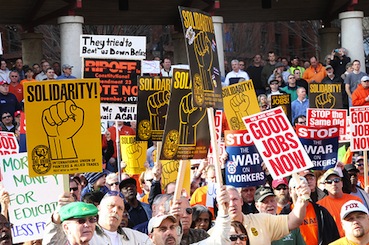Got change? Want change? Spare some and get some by becoming a member of rabble.ca today.
It’s clear we’re going to have to gear up our arguments on right-to-work laws, dues check-off, the Rand Formula, etc.
In the last year, three mainstream parties have introduced proposals for right-to-work-style legal changes in Canada (Brad Wall’s Saskatchewan Party, the Wild Rose Alliance, and now yesterday, Tim Hudak’s Ontario PCs). This used to be terrain solely inhabited by the Fraser Institute and similar extremist camps, but no longer. Clearly, the postwar mainstream consensus that unionization was something to be at least tolerated (or, initially, actively supported) as a mechanism for managing income distribution and workplace relations is long defunct.
Developments in the U.S. (including the northward spread of right-to-work laws, most recently to Indiana, and the dictatorial suppression of collective bargaining rights in Wisconsin and elsewhere) are clearly exerting influence (both economically and politically) north of the border.
Given the general enmity with which unions are currently viewed in many quarters, and the determination by both employers and right-wing politicians that trying to actually destroy unions is both economically and politically feasible, we need to be responding in spades to these arguments.
Some of the obvious conceptual points to counter Hudak and company would include:
– Union membership is very rarely “compulsory” (except under true closed-shop arrangements which are rare). Under Rand-type laws, individuals choose to join or not, but everyone pays dues (to charity if not to the union).
– The economic theory in favour of Rand-type arrangements (as a solution to a well-known “free rider” problem that produces chronic under-investment in collective goods) is strong.
– And of course, workers must make a collective voluntary democratic decision (by secret ballots that are manipulated by employers yet, in most jurisdictions) before any type of Rand-style arrangement can be put in place.
– There’s a strong analogy to taxes: citizens make democratic majority decisions in elections for their government, which then levies taxes to pay for agreed programs. If taxes were “voluntary” then we’d have no schools, hospitals, or roads, and society would collapse. The true goal of right-to-work advocates is precisely that: to cause unions to collapse.
– Private-sector unionization has declined by 5 points in Canada over the last 15 years, to 17 per cent in 2011.
– Ontario’s unionization rate is the second-lowest in Canada (after Alberta): under 28 per cent in 2011, and under 15 per cent in the private sector.
– Strike frequency (days lost in strikes and lockouts as share of total days worked) is 0.03 per cent, down over 90 per cent since the good old 1970s.
– With falling unionization and rare work stoppages, what do these groups think the “problem” is?
– The link between declining unionization and growing inequality is strong and well-documented. If we are concerned with inequality, then we should be working to strengthen collective bargaining relationships (as Newfoundland is doing, for example, with last week’s modest labour law reforms), not to destroy them.
Here are a couple of older research pieces on this matter I have dusted off and posted on the CAW site for our collective ease in reviewing them:
Going South: Cheap Labour as an Unfair Subsidy in North American Free Trade: My paper published by the CCPA in 1991, it estimates that right-to-work laws reduce manufacturing wages by over 15 percent, and then argues this is a “distortion” in normal democratic compensation practices that should be actionable under countervail law. (Of course, our enemies argue that it is unions that are the “distortion”!)
http://www.caw.ca/en/11080.htm
Bad Work: A compendium assembled by the Centre for Research on Work and Society at York in 1997. It contains papers by several labour scholars dissecting a Fraser Institute publication earlier that year expounding the virtues of right-to-work laws.
http://www.caw.ca/en/11081.htm
I’d be interested in hearing about other resources that people may have at hand countering the underlying assumptions and empirical claims about right-to-work laws. In my view, the labour movement needs to take this debate very, very seriously.
Jim Stanford is an economist with CAW. This article was first posted on the Progressive Economics Forum.



